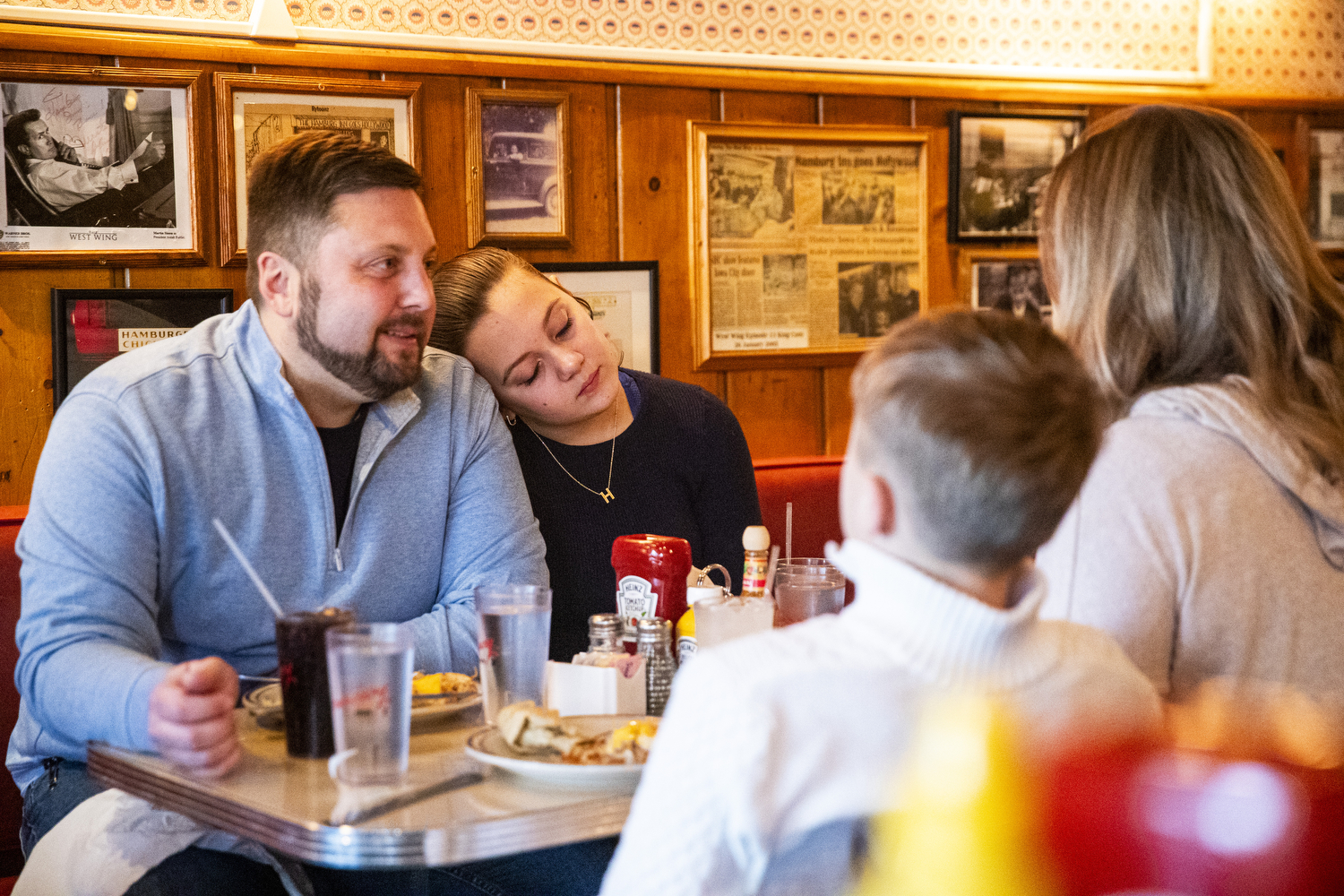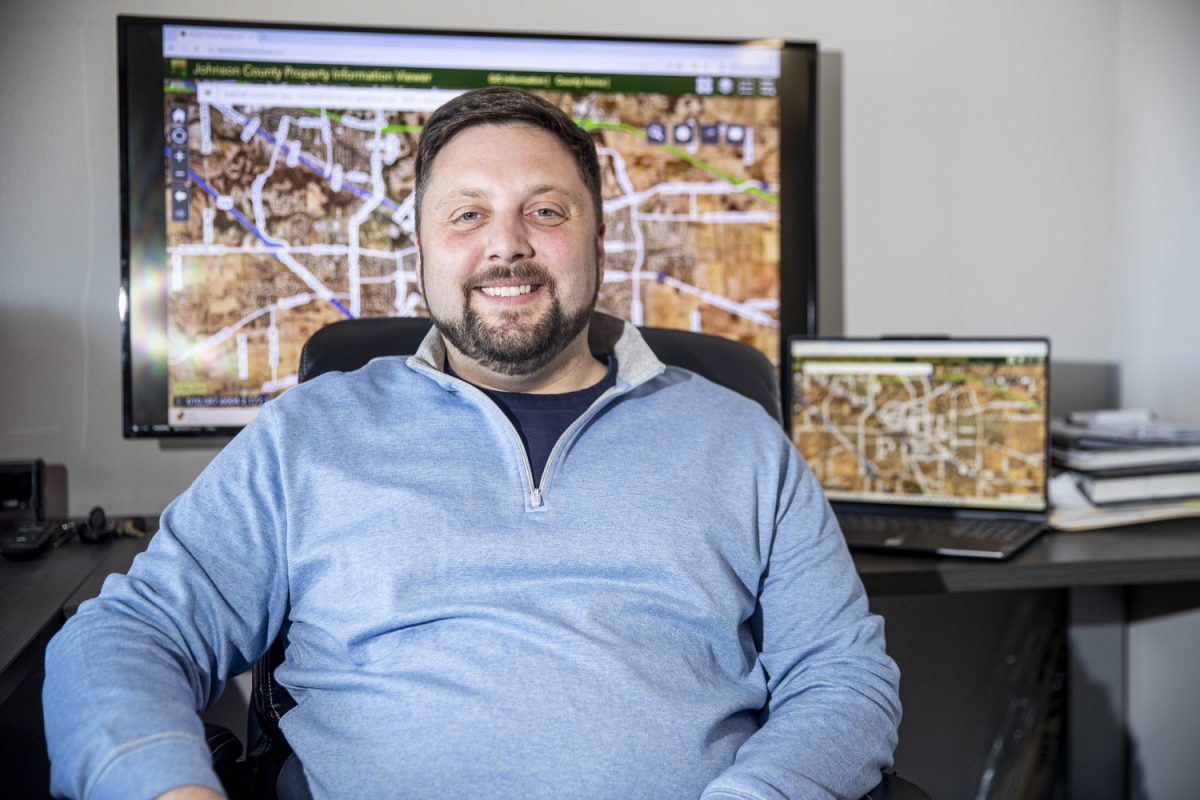Iowa City Northside resident Ross Nusser was already seated in a sea of coffee-drinking college students, sipping from his own white and brown to-go cup, when I walked in and greeted him with a handshake.
The Coffee Emporium on Linn Street is a brief jaunt from the Pedestrian Mall, where much of downtown Iowa City is centralized, but Nusser’s walk was much shorter. Living just across the street from the coffee shop, the property in which he sat was also one he worked to develop not even 10 years ago.
Nusser’s familiarity with the brick streets and buildings, the coffee shops, and the eclectic joints is not new, nor is his Northside connection. In fact, the fifth-generation Iowa City resident has deep ties with the city, a legacy he wants to continue to nurture.
“My combination of experience with government and nonprofits and my desire to serve my community, this is a natural extension,” Nusser said of his motivation to run in the upcoming District C special election in an interview with The Daily Iowan.
Nusser and local advocate Oliver Weilein are running for the now-vacant District C seat, serving an area that outlines the Manville Heights and Northside neighborhoods, as well as much of Shimek. That election, slated for March 4, will be open for all registered Iowa City voters.
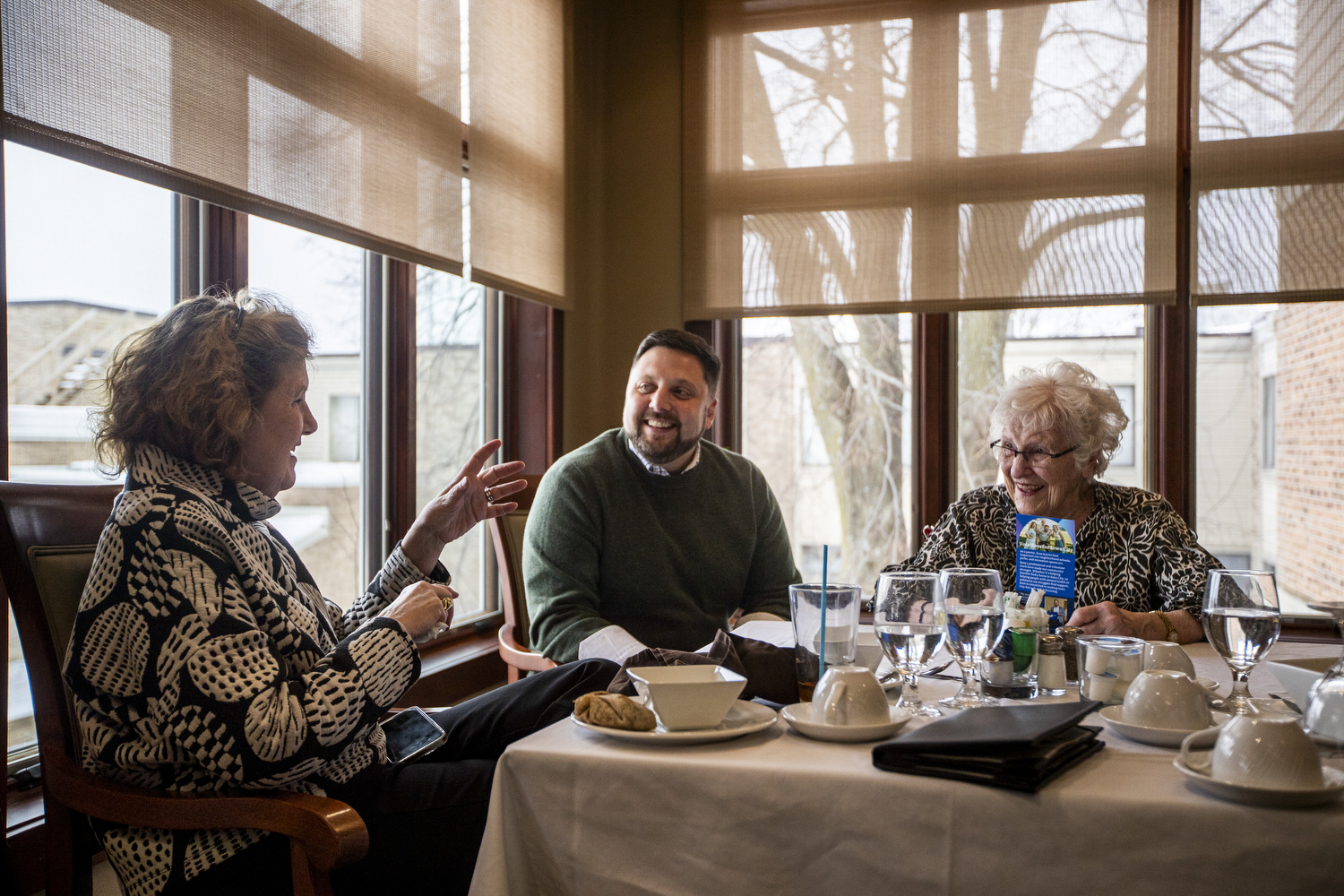
The 38-year-old has lived in town his entire life except during his college years when he attended the University of Arizona, earning a bachelor’s degree in philosophy.
Why Arizona? Former University of Iowa President Sandy Boyd was one reason.
The beloved former leader who presided over the campus for 12 years was Nusser’s maternal grandfather. And attending the same university where your grandfather was in charge can be constricting, he said.
“I left for school to get a different perspective,” he said. “I did leave to not have a spotlight cast, but that was definitely not the primary motivation.”
He traveled to Arizona for variety and to make his own way, as so many do. You could call it wanderlust, but Nusser did not wander forever. He would return to Iowa City in 2008, and the family tree would continue to ramify where it began.
Boyd represents only one part of Nusser’s family tree. Nusser also comes from a line of local business owners who opened and continue to operate what is now Hands Jewelers since the 19th century.
“[Iowa City and I] are inextricably linked,” he said.
Nusser also co-owns and operates his own business in Coralville: Urban Acres Real Estate. He has served the Greater Iowa City area since 2009, further planting a stake in the community.
Nusser said his experience in the real estate market grants him an advantage in a race steeped in questions and controversy around development concerns that have plagued Iowa City with increasing debate surrounding housing affordability.
Experience is important, Nusser said, who argues that a career in the real estate business has provided him with practicality and understanding.
“It’s easy to have an idea that sounds good on paper,” he said. “But in the real world, there are real logistical constraints on some of these things where we can’t just do everything that sounds good.”
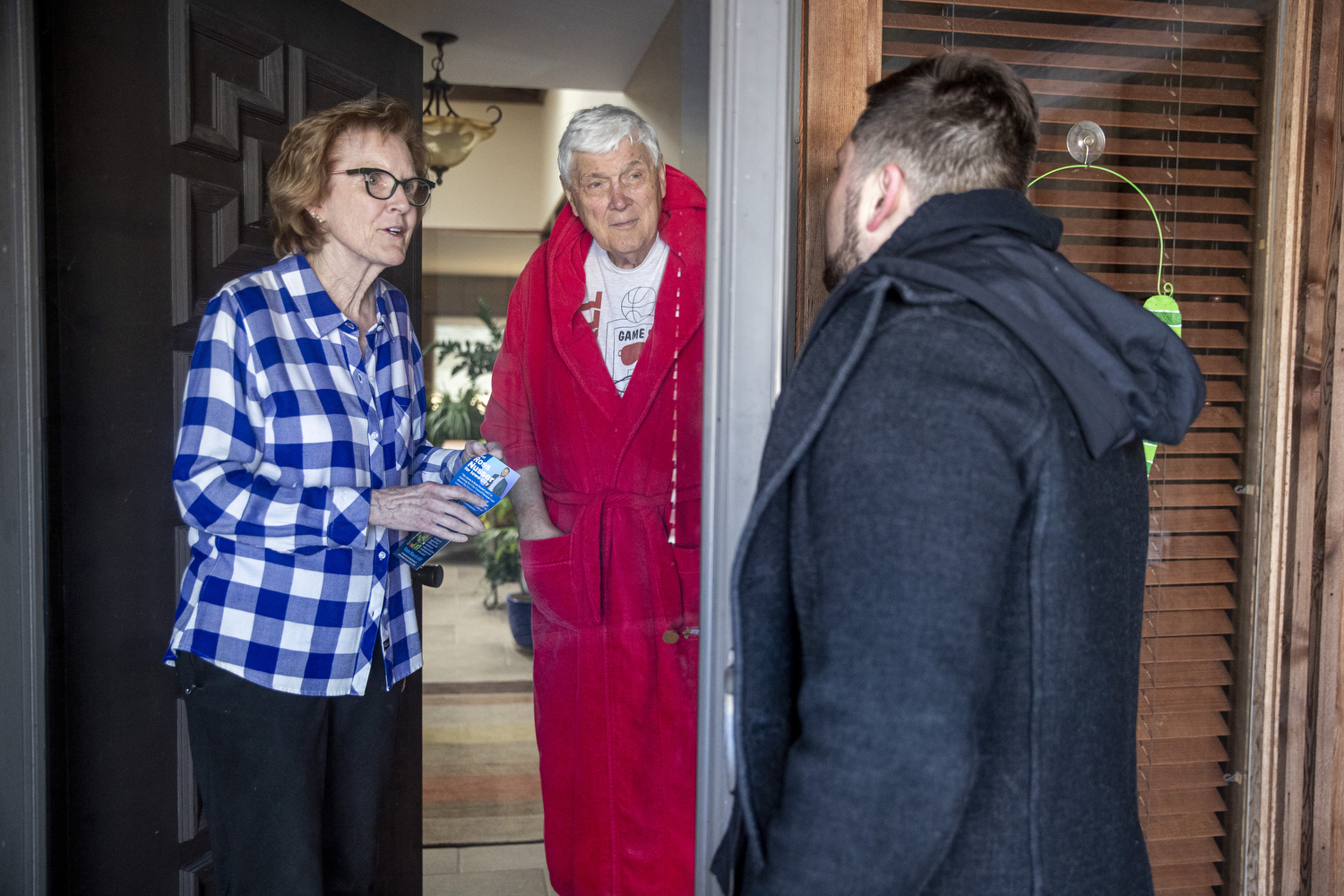
Nusser has named affordable housing and mental health care as objectives in his campaign and believes his understanding and ideas to solve these issues are what the city needs.
Affordable housing is a critical issue among Iowa City residents, and both candidates have addressed ideas about making more housing available to a wider range of incomes. In a Feb. 12 question and answer session at Oaknoll Retirement Residence, community members voiced concerns about the high costs of living in Iowa City, with Nusser reaffirming his belief enhanced nonprofit support can help address these issues.
He cited the Housing Trust Fund of Johnson County as a nonprofit he would aim to support as a part of the fight to improve housing affordability. Programs such as these may provide no-interest loans and leased land contracts, which combat high living costs.
Nusser said a central City Council directive, its comprehensive plan, is an important, systematic approach to responsible development. The plan, he said, is intended to incentivize strategic development in Iowa City.
The plan itself is a 115-page document addressing city land use abilities, regulation of infrastructure like floodplains in response to the 2008 Iowa River flood, and economic development incentives, among a myriad of other subjects that define the City Council’s development goals for the next several years.
Nusser said he believes the city needs to focus on these big-picture development plans to guide the ecosystem between land developers, city government, and local businesses. He emphasized property development and real estate should be affirmed instead of “villainized,” a portrayal brought to the forefront during the race, as Weilein has historically fought against landlords and for housing as a human right.
“It’s villainizing those who are trying to do it [develop],” he said. “It’s counterproductive to the goals of the city.”
In 2018, the property at 202 N. Linn St., home to the Webster, was rezoned by the council to allow Nusser to develop the property. Initially, he indicated the property was idealized for senior housing at a June 2017 meeting. Nusser said due to a misunderstanding by his attorney of regulatory language by the U.S. Housing and Development, however, the planned property would no longer be suitable for senior housing, according to Little Village Magazine.
The building finished construction in 2019 and is now home to several condominiums for sale and listed by Nusser and other agents at Urban Acres.
Phil O’Brien, realtor and broker at Urban Acres, said in a conversation with the DI that Nusser is someone who understands the housing market and its needs.
O’Brien mentioned the continuous efforts that Nusser and others at Urban Acres undergo to lobby for government-market tools like tax increment financing, or TIF, which is used to prioritize development in some areas by specifically adjusting property tax rates to allow cheaper property development.
“It’s not just about making a living, it’s about giving back to the community,” O’Brien said of Nusser’s work.
Nusser currently serves as the board president of Community & Family Resources and is a board member at Successful Living, both nonprofits serving much of Iowa that, in addition to providing affordable housing assistance, deal with mental health and substance abuse prevention and awareness.
Nusser said he is committed to policies and actions that address the individuals who struggle with mental health issues, a sentiment Community and Family Resources Executive Director Michelle De La Riva agreed with in a conversation with the DI.
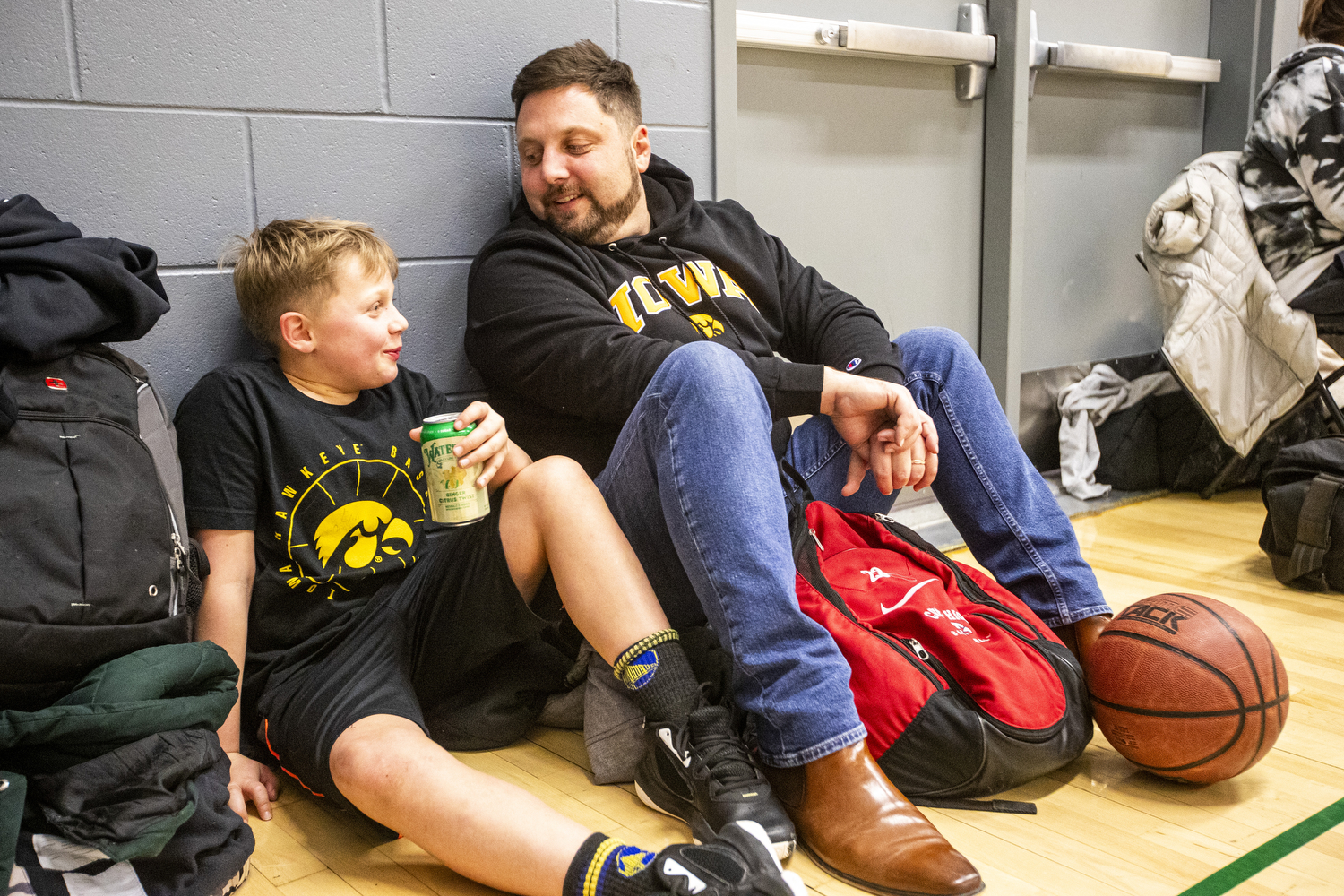
Community and Family Resources provides outpatient and residential behavioral health programs that assist patients with substance addictions as well as help prevent them. De La Riva said Nusser’s business and treatment experience positions him to serve as an effective voice on the City Council, where he will help put policies in place that could help individuals in need.
“I just think that if people are looking for someone who has a heart for their community, Ross is certainly their candidate,” she said.
Campaign controversy
In 2018, according to court documents, Nusser and his then-wife Jill Gretter entered divorce proceedings.
At that time, Nusser also underwent a lawsuit by American Express and received a wage garnishment of his earnings at Urban Acres as a result of unpaid credit card debt and property taxes totaling over $75,000. Nusser said this came at a time of recovery from active substance addiction.
“We found ourselves like a lot of people in trouble not knowing what to do,” he said. “I was so entrenched in the middle of active addiction that I couldn’t do anything. I could’ve just settled it out. I had young kids, and I was trying to get sober.”
Nusser has critized Weilein’s social media history and Weilein himself — a theme of analyzing his opponent’s personal history.
RELATED: Iowa City City Council candidate Ross Nusser speaks at Q&A event
In a public appearance by both candidates in a meeting on Feb. 10 sponsored by Moms Demand Action — a firearm training and education advocacy group — Nusser called out a number of what he called “troubling social media posts” made by his opponent over the past several years.
Among them, Nusser pointed out one that made light of the Jan. 6 insurrection at the U.S. Capitol and another that indicated his opponent’s ownership of an AR-15 assault rifle. Nusser noted, however, that he also owns a firearm.
Weilein, in response, said he purchased the firearm for self-defense against death threats received from individuals who disagree with his work to serve marginalized populations and LGBTQ+ Iowans, and deleting his past social media posts in light of the election would be dishonest.
“There is no place for that kind of extremism in local leadership,” Nusser said during a portion of the meeting. “I see firsthand how gun violence is tied to so many other systemic issues, domestic violence, suicide, addiction, and
community trauma.”
The two candidates have also posed different opinions on issues like ICE’s presence in Iowa City.
Weilein came out strong against ICE, for instance, referring to the federal immigration agency as a “terrorist organization” at a January debate hosted by the Johnson County League of Women Voters.
“I think that ICE should not exist, and I think that ICE is a terrorist organization in the U.S. that separates families,” Weilein added.
Nusser, in turn, has criticized anti-ICE stances, a position he said was “mischaracterized” by Iowa City residents.
In a Feb. 1 Facebook post, Nusser encouraged cooperation with ICE authorities, saying a failure to comply would translate to critical state and federal funding dollars being stripped from the Iowa City community.
These comments were met with a negative community response, with some Facebook responders calling Nusser’s opinion “a losing position.” The minority of responders took the opposite side, with one calling Nusser’s response “spot on.”
Nusser elaborated on his position in his interview: Fighting ICE and losing millions of dollars in public funding will only hurt the city’s ability to protect marginalized communities further.
While speaking with the DI, Nusser drew a contrast between himself and his opponent Weilein — a trend during his campaign.
“I bring a level of experience that he just does not have,” Nusser said, referring to his experience on nonprofit boards and working directly with the real estate market.
Iowa City Councilor Shawn Harmsen has publicly endorsed Nusser and said he agrees with his position on the current presidential administration.
“He noticed the mission was to vote for Kamala to stand up against Trump in 2024,” Harmsen said in a conversation with the DI.
Harmsen complimented both candidates, however, for their efforts to support the Iowa City community and said he is happy to have service-minded individuals running for City Council.
“I think it is a very Iowa City thing to have two candidates running for office who have found ways to give back to their community before running for City Council,” he said.
After meeting Nusser in January, Harmsen said he was impressed by his ideas for and attitude toward key issues like affordable housing, and Nusser, even with overlap between the two candidates, has greater expertise to handle the challenges.
“I was really impressed with Ross’s work and how he talks about his work,” he said, “also his discussion about facing down his own demons, not just doing that for his own good but also helping other people in the community with their own alcohol or substance abuse issues.”
Nusser summed up his campaign for Iowa City City Council as one built on a foundation of advocacy for the improved health and living conditions of those in Iowa City and Johnson County as a whole.
He said he believes his extensive history serving Iowa City residents will prove that sentiment through relationships and support for the people and organizations that make Iowa City special.
“We have real people who have dedicated their real careers to solving these real issues right now,” he said, “and they just need to be propped up and emboldened and supported.”
